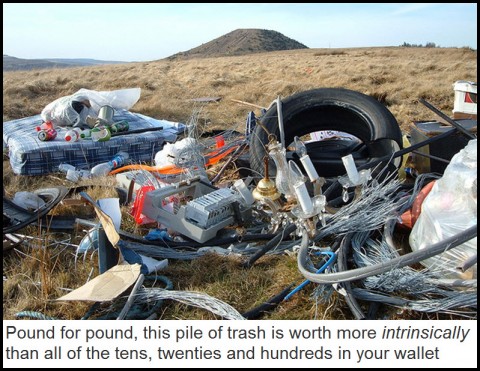or nearly twenty years, we haven’t flinched from our prediction that the massive debt build-up of the last generation would precipitate out as a deflationary bust. That is what we still expect, although we now believe there is likely to be a hyperinflationary phase at some point as the financial system implodes. But the bottom line is that no matter how things play out, America’s standard of living will fall more steeply than at any other time since the Great Depression. As for the deflation-vs.-hyperinflation “debate,” it is useful only to the extent it helps predict how mortgage debtors will fare as this economic cataclysm plays out. We seriously doubt they will be “saved” by the kind of hyperinflation that would put hundred-thousand-dollar bills in Joe Homeowner’s wallet. Imagine how mortgage lenders would react if Joe could peel off three or four of those bills and say, “Okay, pal, we’re square.” This scenario will seem particularly unlikely to those who believe that these economic hard times have been engineered by Masters of the Universe intent on stealing our property. Trust us on this: If there’s a hyperinflation, it is the rentiers who will get screwed most ruinously, not the little guys.

Even so, that doesn’t rule out the prospect of a fleeting, hyperinflationary spike on the way down, since widespread notions concerning the dollar’s true value could change precipitously overnight. We mention this because notions are already beginning to change in ways that leave the dollar increasingly vulnerable to a global run. The exploding caldera of fear that will eventually bring this about bubbled to the surface yesterday when the Fed confirmed yet again that it is absolutely clueless about how to get the economy moving. The central bankers’ muddled talk of still more “quantitative easing” (QE2) is about as reassuring as the promise of more sanctions against Iran. Paul Krugman may be the last person in America who still believes that additional heaps of “stimulus” will do the trick. On Wall Street, however, the belief is clearly ascendant that QE2 will only wreck the dollar without providing any lift to the economy. That could explain why stocks fell yesterday while gold and silver soared. Not that the yahoos on Wall Street exhibited perfect knowledge. To the contrary, the broad averages shot up initially, driven by headless-chicken panic, and T-bonds finished the day with anomalously large gains despite the louche tittering about further easing.
Wednesday, September 22, 2010
Another Hyperinflationary Scenario
Schiff’s Scenario
Peter Schiff has provided the most plausible scenario for a hyperinflation. He foresees a day when confidence in the dollar collapses, as it eventually must, forcing the Fed to become the sole buyer of Treasury debt. When municipal and corporate bond traders realize on that same day that there is no official support for their markets, private debt will go into a death spiral, forcing the Fed to monetize all bonds. Under the circumstances, the Fed would not become merely domestic debt’s buyer of last resort, but the only buyer. Voila! Hyperinflation.
It should be noted that it is not some certain quantity of money injected into the banking system that will cause hyperinflation; rather, it will be the repudiation of all dollars already in circulation. Holders of physical dollars will panic to exchange them for anything tangible, causing the dollar’s value to fall to zero in mere days. Everything needed to trigger this collapse is already in the pipeline, and it is only the truly benighted, Nobelist Paul Krugman foremost among them, who cannot see the obvious. As for mortgage debt, you will still owe $250,000 on your home the Day After, except that your home will be much more deeply underwater than before – worth perhaps $20,000 instead of $180,000. Mortgage lenders will have to work with you – work with scores of millions of homeowners who are in the same boat – to bring about a reconciliation. No one can predict how already-unpayable mortgage debt will ultimately be paid, but it is almost certain to require a radical change in our laws in order to avoid the kind of social upheaval that could jeopardize the very rule of law.
Labels:
debt,
debt crisis,
Fed,
Federal Reserve Bank,
hyperinflation
